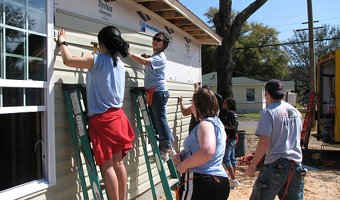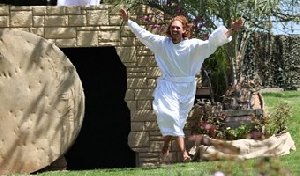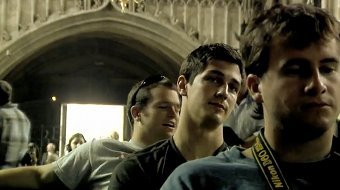Around the State
• The Singing Men of North Central Texas will present a concert at Dallas Baptist University April 15 at 7 p.m. The concert is free and open to the public.
• Recording artist Cynthia Clawson will perform at the dedication of Howard Payne University’s newly renovated Mims Auditorium April 15 at 10:30 a.m. A former HPU Heritage Singer, Clawson also will join others from the group’s 1970s in a song.
• A LifeWay Women’s “You & Your Girl” event for mothers and their daughters will be April 17 at First Church in Carrollton. Author Vicki Courtney will lead the event, with music by Sonflowerz. The 8 a.m. to 5 p.m. event features several breakout sessions. Admission for mothers is $45. The first daughter is $30, and each additional daughter is $15. Register at www.lifeway.com/ yourgirl.
• Dillon and Buckner International will host a heritage day for adoptive families April 24 at Tallowood Church in Houston to celebrate cultures around the world. The “Travel the World” theme will feature Russia, China, Vietnam, South Korea and Ethiopia. Special entertainment will include a presentation by the Russian Children’s Theatre, Lee’s Golden Dragon Dancers and the Ethiopian Praise Choir. The event will begin at noon and end at 4 p.m. The cost is $10 per adult and $5 per child. To register, call (713) 278-9213, ext. 2222.
• Howard Payne University’s Woman’s Club Yellow Rose luncheon will held April 29 at 11:45 a.m. Author and media analyst Jane Hampton Cook will be the featured speaker. The recipients of the Yellow Rose Scholarship and the Yellow Rose Award also will be announced. Tickets are $10 for members and $15 for nonmembers. For more information, call (800) 950-8465.
• Jason Soles has been promoted to director of admissions at East Texas Baptist University. He had been assistant director since 2006.
• Mario Guerra has been named associate executive director for the emergency services division of Baptist Child & Family Services. He served with the San Antonio Fire Department 34 years.
• Wayland Baptist University is seeking volunteers for a July 27-Aug. 10 mission trip to India. The cost is about $2,000 per person. For more information, call (806) 291-1162.
• Michael Sherr, director of the Baylor University School of Social Work’s doctoral program, will receive the University of Hong Kong’s Young Scholar Award for Outstanding Abstract at the 2010 Joint World Conference on Social Work and Social Development in June.
• Mary Ranjel has been named director of enrollment management and student services at the Baptist University of the Américas. She has worked at the school 33 years and is the first woman on the school’s executive council.
Anniversaries
• First Church in Christine, 100th, March 21. Mike Bender is pastor.
• Westover Church in San Marcos, 70th, April 25. A meal will follow the morning service. Jeff Latham is pastor.
• Jermyn Church in Jermyn, 100th, May 15-16. Former pastors Logan Peterson, Jimmie Warren, David Buckler and Travis Hart will attend. An afternoon of fellowship and testimony is planned for Saturday afternoon. Hart will preach Sunday morning, with a lunch and fellowship time scheduled to end at 3 p.m. Pat Lockhart is pastor.
Retiring
• R.C. Jeanes, as pastor of Cadiz Church in Beeville, April 1. He served the church bivocationally 44 years.
• Wayman Swopes, as pastor of Greenwood Church in Midland, April 25. He has served the church 22 years. He also was pastor of churches in New Mexico, Kentucky and Michigan, as well as First Church in Petersburg.
• Charles Wisdom, as pastor of Waller Church in Waller, April 25. He has served the church six years and has been in ministry 52 years, serving as a pastor, missionary to Mexico and adjunct professor at Southwestern Seminary’s Houston campus.
• Milton Ertelt, as director of missions for Southwest Metro-plex Association, April 30. He has served the association more than 13 years. He and his wife, Charlotte, also served as missionaries in Africa and the Middle East. During his term of service with the association, 36 missions or churches were brought into the association, 20 of which continue to meet.
• Bob Kibbe, as chaplain at McConnell Prison in Beeville. He is available for pulpit supply or interim pastorates at (361) 375-9244.
Deaths
• Bob Graham, 72, March 12 in Fort Worth. He was pastor of Field Street Church in Cleburne 28 years, and was named pastor emeritus. He served as an officer of Johnson Association, and on the boards of Howard Payne University and the International Mission Board of the Southern Baptist Convention. He was pastor of churches in Olney, Blue Mound and Quitman prior to coming to Cleburne. He is survived by his wife of 51 years, Jo Ann; son, Bobby; daughters, Kathryn Frederick and Karen Hartgraves; brother, Jack; and six grandchildren.
• Ernest Stewart, 86, in Sweetwater, March 22. He was a pastor more than 60 years, including churches in Tuscola, Robert Lee, Whiteface, O’Donnell, Big Spring, Mineral Wells, Crosbyton and South Plains, as well as Nebraska and Kansas. He was preceded in death by his son, Ernie Jr., and grandson, Shawn Stewart. He is survived by his wife of 68 years, Jerry; son, Cliff; daughter, Annette Thomas; sisters, Evelyn Looney, Helen Johnson, Betty Schwenson and Bonnie Becton; six grandchildren; and 16 great-grandchildren.
• B.W. Aston, 73, March 25 in Abilene. He began teaching history at Hardin-Simmons University in 1967, and retired from the university 35 years later. He served as president of the HSU faculty and was chosen as faculty member of the year in 1989. He also served as dean of the College of Liberal Arts. He and his wife toured all 50 states, travelled southern Canada from Vancouver to Prince Edward Island and visited more than 70 foreign countries. He was active at University Church and Pioneer Drive Church in Abilene. He served both churches in a variety of capacities, from cook to chairman of deacons. He was preceded in death by his brother, Verlon. He is survived by his wife of 48 years, Lillie Mae; and brother, Weldon.
• Joseph Weatherby Jr., 74, March 29 in Brownwood. He had been a Howard Payne University professor 14 years and was the Sandefer scholar-in-residence and a professor of political science at the time of his death. He was instrumental in the creation of the Model United Nations program at the university and was a frequent sponsor on student trips around the world. He spent more than 40 years teaching, and he also was professor emeritus at California Polytechnic State University. He was preceded in death by his daughter, Anne Weatherby. He is survived by his wife, Jane; son, James; daughter, Holly Nickerson; and sister, Sarah McAlpine.
Events
• First Church in Devers will hold its eighth annual gumbo cookoff and gospel singing April 24. Judging will begin at 5 p.m., eating at 5:15 p.m. and singing at 6:15 p.m. One Desire and Appointed by Grace will be the featured singing groups. For more information, call (936) 549-7653. Harry McDaniel is pastor.
• Jim Denison, theologian-in-residence for the Baptist General Convention of Texas, will speak on “Radical Islam: Past, Present and Future Implications” at the Men of Faith fellowship breakfast May 13 at 8 a.m. at the Quail Point meeting room at Horseshoe Bay. Tickets are $10. For more information, call (830) 598-8390.
• The Singing Men of South Texas will present a concert at First Church in Pleasanton May 20 at 7 p.m.
Ordained
• Jason Daniels to the ministry at First Church in Haskell.
• Jody Simmons to the ministry at First Church in Cherokee.
• Robbie Fox to the ministry at Everyday Christian Fellowship in Cibolo.
• David Hudson to the ministry at Baptist Temple in Victoria.
• Jack Hilt to the ministry at Calvary Church in Aransas Pass.
• Danny Brueggeman, Kent Colley, Ervin Frierson, Dave Harrison, Joey Kimbrough, Cliff Morris and John Rutkowski as deacons at First Church in Haskell.
Revivals
• Blanconia Church, Refugio; April 11-14; evangelist, Norman Rushing; pastor, David Mundine.
• Hays Hills Church, Buda; April 18-21; evangelist, Robert Barge; music, David Guion; pastor, David Sweet.
• First Church, Devers; April 18-22; evangelist, Rick Ingle; music, Paul and Christy Newberry; pastor, Harry McDaniel Jr.
• De Berry Church, De Berry; April 24-25; evangelist, Jim Walsh; pastor, Hal Rymel.
• Avondale Church, Sweetwater; April 25-28; evangelist, Robert Barge; pastor, Jason Shuttlesworth.












